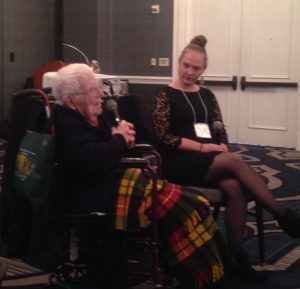Cognitive therapy is probably still understood by most to be about trying to reduce or dispute “thinking errors” or such. But last week, at the ISPS-US conference, I had a chance to hear from Aaron Beck and his team (Beck is still quite active at 97 years old!) and it was interesting to see just how much they have moved toward evoking something positive as their first priority.

Aaron Beck at 97 years old, presenting at the 2018 ISPS-US conference, alongside his colleague Ellen Inverso
Beck’s current work is recovery oriented cognitive therapy for psychosis. They see the core of the work as being finding ways for people to have experiences that give them or help them find a sense of meaning, connection, and purpose. Their overall aim is still to change beliefs, especially the “self defeating beliefs” that lead to “negative symptoms” but they see those beliefs as often falling away as people have access to the positive stuff.
Beck overtly stated that therapy should be person centered, not symptom centered (even though so much CBT is the latter.)
I really liked lots of the examples given about how to be person centered even when faced with challenging stuff. For example, one person in the audience asked how to talk with a guy who claimed to have been roasted in an oven. Beck said first he would acknowledge the story, then he would be curious about what that was like, how he felt etc., then he would ask about other times in the person’s life when he may have felt that way, or does anything currently make him feel that way. It seemed he was describing a process of following the vein of emotional content to where it would connect with more realistic biographical facts or current issues.
Beck stated that helping the person get going with something positive, something that has meaning and purpose for the person and gives them a sense of connection, tends to “suck the juice out of” any delusion.
He was also very much into discovering the wants and needs behind even very challenging behaviors. One story was about a doctor trained in recovery oriented cognitive therapy, who had a patient who was saying he wanted to shoot him. So instead of treating it as a symptom, he asked the patient, “why do you want to shoot me?” The patient responded, “because you are planning to shoot me.” “But,” the doctor explained, “I don’t even own a gun!” “Well,” said the patient, “you use your drugs like a gun.” The doctor thought about it and said, “I wonder if you are feeling you have very little control? That must be frustrating. But I know you must have lots you want to do outside of here and I want to help you get out so you can do that!” This made sense to the person and they started to work together.
One good introduction to recovery oriented cognitive therapy for psychosis is the following recorded webinar:
In addition, SAMSHA now has available a series of webinars that goes into more detail about this approach, at this link.



